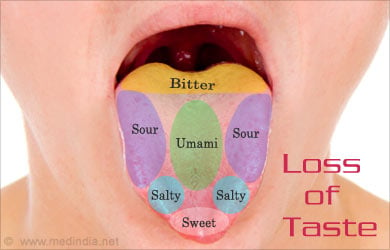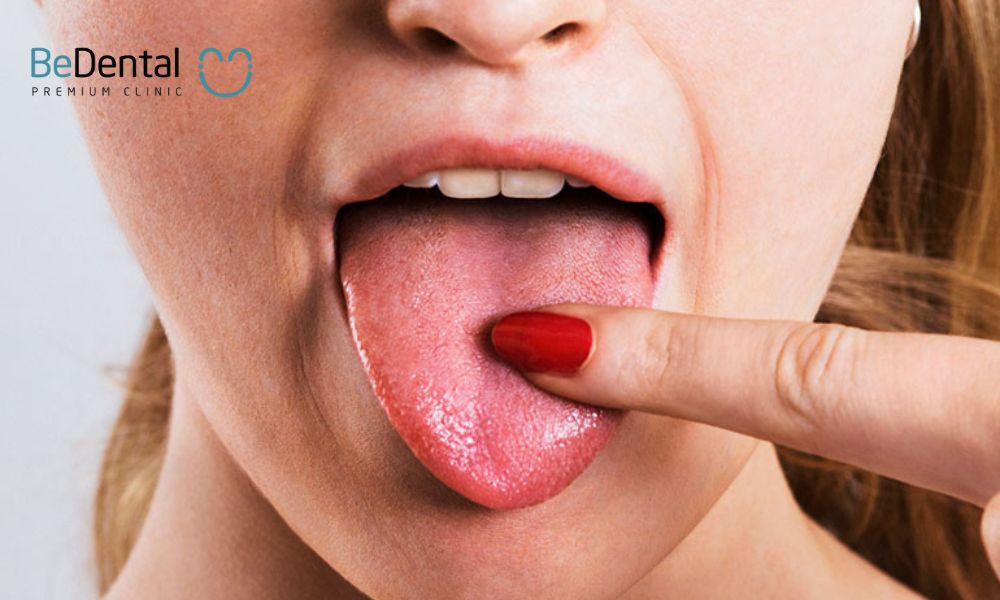What is loss of taste? How to deal with loss of taste in Vietnam? What are the common causes of this condition? Read on to understand more about how loss of taste can be a symptom of a certain disease.
What is loss of taste?
Currently, many people do not have a clear understanding of what loss of taste is. It is a condition that prevents you from perceiving the normal taste of food. Typically, loss of taste is categorized into different types, including:
- Reduced taste, phantom taste (perceiving a taste that is not actually present);
- Loss of sensation for a particular taste;
- Complete loss of taste sensation.
Although abnormal taste can also be due to psychological disorders, local causes should always be investigated. The integrity of the gustatory nerve and facial nerve can be determined by testing taste on both sides of the tongue using sugar, salt, vinegar (acid), and quinine (bitter).


In most cases, each taste receptor has different effects. We rarely notice changes in taste when it is limited to one side of the tongue. Sudden loss of taste can also be an initial symptom of coronavirus disease 2019 (Covid-19) or acute respiratory distress syndrome caused by coronavirus 2 (SARS-CoV-2).
Loss of taste is a symptom of what disease?
Loss of taste is a symptom of what disease? Some health issues can cause discomfort in the mouth or lead to loss of taste, such as:
Taste disorders
Taste disorders make the mouth have a persistent taste that overpowers all other tastes. You may find that all the food you taste has the same taste. People with taste disorders often describe the taste in their mouth as:
- Foul;
- Bad;
- Salty;
- Sour;
- Like a metallic taste.
Reduced taste sensation
Reduced taste sensation is the condition of losing the ability to taste a certain taste. People with this condition may not be able to perceive the primary tastes such as:
- Bitter taste;
- Sour taste;
- Salty taste;
- Sweet taste;
- Umami taste.
Olfactory disorders
The tongue is not the only organ that plays a role in sensing flavors. The ability to sense flavors is difficult and complex because it is connected to the entire tongue, throat, palate, and nose. Therefore, the sense of smell also has a significant impact on food recognition. Those who have partially or completely lost their sense of smell may perceive it as a loss of taste.
Loss of taste caused by side effects of certain medications
Some medications can also affect the ability to taste with the tongue. These medications include:
- Macrolides;
- Antifungal drugs;
- Fluoroquinolones;
- Protein kinase inhibitors;
- HMG-CoA inhibitors (statins);
- Angiotensin converting enzyme inhibitors.
Ageusia causing complete loss of taste with the tongue
Ageusia is the condition of completely losing the sense of taste and being unable to taste any flavors. However, this condition is very rare. A 2016 study estimated that only 3% of people with true loss of taste have ageusia.
Other signs of loss of taste with the tongue
Loss of taste is a symptom of what disease? Other signs that can cause taste disorders and loss of taste include:
- Sinusitis;
- Middle ear infection;
- Poor oral hygiene;
- Upper respiratory tract infection;
- When undergoing surgery in the mouth, throat, nose, or ear;
- Having dental issues such as gum disease;
- Direct exposure to certain chemicals like pesticides. Undergoing radiation therapy to treat head and neck cancer;
- In addition, there are some issues related to the nervous system, such as head trauma or neurological disorders.
- Loss of taste can also occur in smokers, gum disease, oral thrush, or cancer patients undergoing radiation therapy;
- Sudden loss of taste due to high fever can also be an early symptom of coronavirus disease 2019.

How to recognize loss of taste
When you have symptoms and signs of loss of taste, you should visit an otolaryngologist. The doctor may request you to undergo some clinical tests such as:
- Krarup’s electrical taste test: Using a small direct current of 0-500 micro amperes, applying the positive electrode to one side of the tongue for 0.5-1 second will cause a metallic sour sensation. If increasing the current intensity up to 300 micro amperes does not produce any sensation when comparing both sides, it is considered as loss of taste.
- Boorstein’s taste solution test: Using sweet, salty, sour, bitter solutions and applying them to the side edges of the tongue and comparing both sides. You have to wait about 5 minutes before trying again to assess the extent of taste loss.
What to do with loss of taste? How to deal with loss of taste in Vietnam?
Loss of taste, what to do? Loss of taste can be temporary or permanent, depending on the cause. The condition of losing taste can be due to various reasons such as sinusitis, oral surgery, medication, or rare syndromes.
In simple cases such as loss of taste due to a common cold or flu, the doctor will not prescribe medication and wait for you to recover for taste to return to normal. Additionally, to treat loss of taste, the doctor may:
- Provide local sprays or antihistamines to treat nasal and sinus disorders;
- Consider discontinuing suspected medications that may cause taste reduction;
- Supplement with necessary nutrients;
- For people with sinusitis or middle ear infection, the doctor may prescribe antibiotics. In more severe conditions such as neurological disorders or head trauma, the doctor may refer you to appropriate specialists for appropriate treatment plans.
Loss of taste can make you feel uncomfortable, loss of appetite, and can create anxiety and depression. Currently, the treatment will depend on the underlying cause of the disease and may require a longer period of time. Patients will need to be persistent and cooperate to gradually overcome the decreased sense of taste.
For specific conditions such as high fever without taste, symptoms of Covid-19, or respiratory diseases, the loss of taste will last until the patient fully recovers.
In addition to following the doctor’s instructions, you can also take some self-help measures at home, such as:
- Quit smoking if you are a smoker;
- Use over-the-counter antihistamines to reduce nasal inflammation if necessary;
- Maintain oral hygiene by brushing your teeth, using dental floss, and using mouthwash daily.

Below is an article shared by Bedental. If you have any questions or need advice about your current condition, you can contact the team of doctors for the most detailed and attentive answers.
Causes of loss of taste
There are many causes of loss of taste, including some related to respiratory diseases such as colds, flu, sinusitis, throat infections, and middle ear infections.
In addition, loss of taste can also be due to nervous system issues such as head trauma or neurological disorders.
Furthermore, smoking, gum disease, dental problems, and the use of certain medications can also cause loss of taste.
It is worth noting that in cases of high fever and sudden loss of taste, this could be an early symptom of coronavirus disease 2019 (COVID-19), caused by the SARS-CoV-2 virus that leads to severe acute respiratory syndrome.
Some dietary tips to improve symptoms of loss of taste and smell
- Eat your favorite foods
When you feel uninterested in eating but still need to eat for your health, start by choosing your favorite foods. Focusing on the everyday foods you love will motivate you to eat.
Although a varied diet is usually encouraged, there is no problem if you only eat a few favorite foods regularly, as this is still better than not eating anything.
- Focus on other senses
If you have difficulty perceiving the taste of food, focus on other senses such as vision.
For example, you can observe the appearance of the food and pay attention to its colors and decorations. To stimulate the senses of sound and touch, you should chew slowly and feel the crispness and softness of the food. This can help you perceive the food as more delicious.
- Add aromatic spices to your food
If you are experiencing issues with taste, add aromatic spices like ginger, cinnamon, and mint to your food to enhance the flavor and stimulate your sense of smell.
In addition, you can use sour-tasting foods like vinegar, lemon, and orange to stimulate your taste buds, helping you better perceive the taste of the food.

- Eat little and divide into many small meals
When experiencing loss of taste and smell due to COVID-19, eating a large amount of food in one meal can be difficult and make the patient lose interest in eating.
Therefore, the best way is to eat little and divide into many small meals throughout the day to make it easier for the patient to eat and help the body absorb nutrients better.
Loss of taste and smell can cause inconvenience and stress for the patient. However, the patient needs to stay optimistic and take good care of themselves, while ensuring adequate nutrition by trying different ways of eating. The senses will recover shortly after recovery.
Taste disorder: be wary of the dangers of not treating it in time
Taste disorder is a condition in which the patient does not fully perceive the tastes of sweet, salty, sour, bitter, or cannot distinguish whether the food is delicious or not. The disease can be chronic or temporary depending on the underlying cause. Taste disorder is divided into two main types: loss of taste and decreased taste.
Loss of taste is when the patient cannot distinguish tastes, only senses some tastes, or cannot perceive the taste of certain substances. Decreased taste is when the ability to perceive taste is reduced, or even tastes are perceived incorrectly. The patient may completely lose the ability to perceive all tastes or only perceive some tastes.
There are three main causes of taste disorder: impaired function of the nerves that transmit taste sensations to the brain (transportation loss), damage to the nerves that convey taste sensations to the brain (nerve loss), or malfunction of the taste buds (sensation loss).
- Taste loss due to transportation is often caused by dry mouth, caused by factors such as radiation therapy, heavy metal poisoning, and the formation of taste bud calculus.
- Taste loss due to sensation usually originates from factors such as inflammation in the oral cavity, the effects of certain medications (such as antithyroid drugs, anticancer drugs), radiation therapy in the oral and throat cavities, viral infections, endocrine disorders…
- Nerve-related taste loss occurs due to trauma, surgeries that damage the nerves that convey taste sensations to the brain. It is common in patients with kidney disease who have an increased taste threshold for sweet and sour tastes. However, after blood filtration, the disease will heal itself.
Loss of taste also means losing a warning system for the dangers we may encounter when eating toxic, spoiled, or allergenic foods…
You can refer to this for more information:
To have dental plaque and teeth whitening done at the same time.
Tư vấn chuyên môn bài viết:
BÁC SĨ DƯƠNG THỊ THÙY NGA
BEDENTAL - TOP STANDARD DENTISTRY SYSTEM
In HANOI
Address 1: 7B Thi Sach St, Ngo Thi Nham, Hai Ba Trung Dist, Ha Noi. - 0934.61.9090
Address 2: No 129 Hoang Ngan, Yen Hoa, Cau Giay Dist, Ha Noi. - 0934.61.9090
In HO CHI MINH
Address 1: 53 -55 -57 Pho Duc Chinh St, Nguyen Thai Binh, Dist. 1, Ho Chi Minh. - 0766.00.8080
Working: 9am - 8pm everyday
Website: https://bedental.vn/en/







Pingback: CAUSES OF BITTER TASTE IN THE MOUTH AND EFFECTIVE TREATMENT – Be Dental